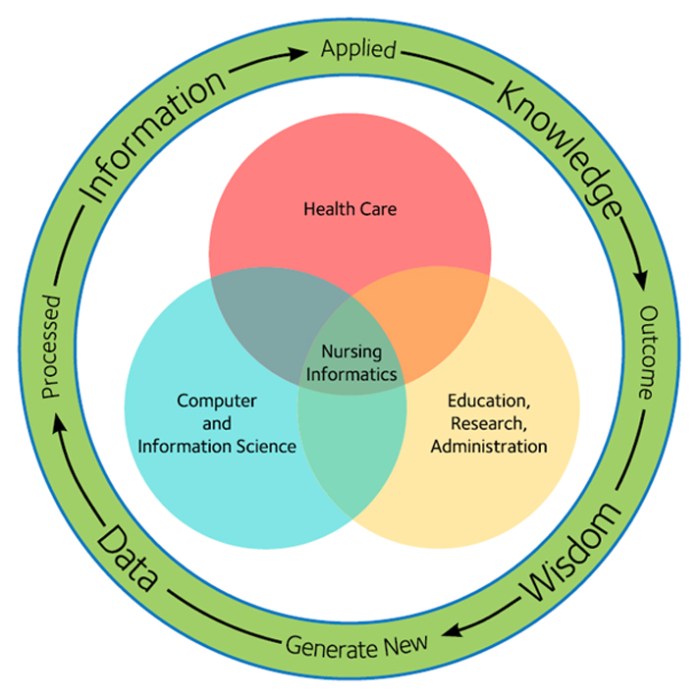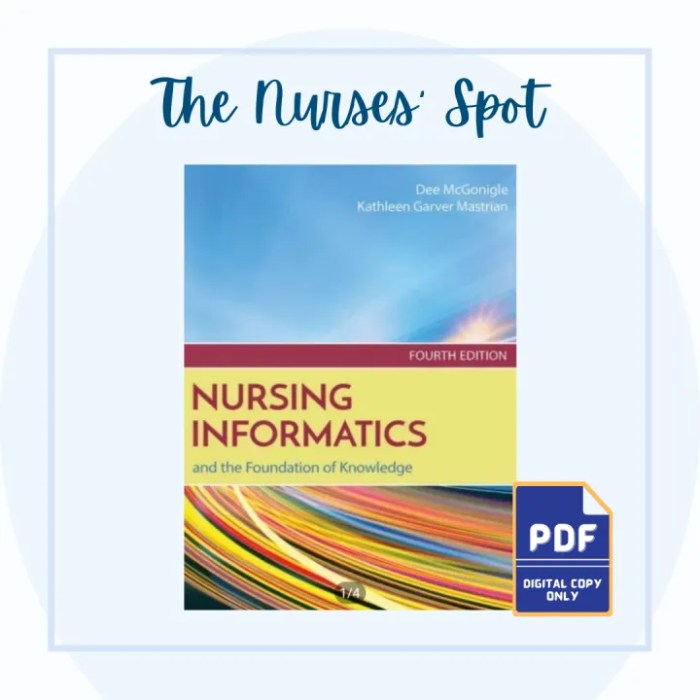Nursing informatics and the foundation of knowledge 4th edition – Nursing Informatics and the Foundation of Knowledge, 4th Edition, offers a comprehensive exploration of the rapidly evolving field of nursing informatics. This authoritative text provides a solid foundation in the key concepts and principles of nursing informatics, equipping readers with the knowledge and skills necessary to navigate the complex healthcare landscape.
The fourth edition has been thoroughly revised and updated to reflect the latest advancements in nursing informatics, including the integration of technology into all aspects of patient care. With a focus on evidence-based practice, this edition emphasizes the role of nursing informatics in improving patient outcomes, enhancing healthcare quality, and shaping the future of healthcare delivery.
Foundations of Nursing Informatics

Nursing informatics is a rapidly evolving discipline that combines nursing science, computer science, and information science. It is the application of information and technology to support nursing practice, education, research, and administration.
The key concepts and principles of nursing informatics include:
- Patient-centered care: Nursing informatics is focused on improving patient outcomes by providing nurses with the information and tools they need to deliver patient-centered care.
- Data-driven decision-making: Nursing informatics uses data to support evidence-based practice and improve decision-making.
- Interdisciplinary collaboration: Nursing informatics requires collaboration between nurses, other healthcare professionals, and information technology professionals.
- Technology adoption: Nursing informatics promotes the adoption of technology to improve nursing practice and patient outcomes.
Nursing informatics is used in a variety of ways in practice, including:
- Electronic health records (EHRs): EHRs are used to store and manage patient health information. They can be used to improve communication between healthcare providers, reduce medical errors, and improve patient safety.
- Clinical decision support systems (CDSSs): CDSSs are used to provide nurses with information and tools to help them make clinical decisions. They can be used to identify patients at risk for certain conditions, recommend appropriate treatments, and provide guidance on patient care.
- Telehealth: Telehealth is the use of technology to deliver healthcare services remotely. It can be used to provide care to patients in rural areas, patients with transportation challenges, and patients with chronic conditions.
Data Management and Analysis in Nursing Informatics

Nursing informatics relies on the collection, analysis, and interpretation of data to improve patient care. The different types of data used in nursing informatics include:
- Patient data: Patient data includes information about the patient’s health history, current health status, and treatment plan.
- Nursing data: Nursing data includes information about the nursing care that the patient has received.
- Administrative data: Administrative data includes information about the patient’s demographics, insurance information, and billing information.
The methods for collecting, processing, and analyzing nursing data include:
- Manual data collection: Manual data collection involves collecting data using paper forms or charts.
- Electronic data collection: Electronic data collection involves collecting data using electronic devices, such as computers or tablets.
- Data analysis: Data analysis involves using statistical and other methods to analyze data and identify trends and patterns.
Data analytics is used to improve patient outcomes by identifying patients at risk for certain conditions, predicting the likelihood of complications, and developing targeted interventions.
Information Systems in Nursing Informatics: Nursing Informatics And The Foundation Of Knowledge 4th Edition

Information systems are used to store, manage, and analyze data. The different types of information systems used in nursing include:
- Electronic health records (EHRs): EHRs are used to store and manage patient health information. They can be used to improve communication between healthcare providers, reduce medical errors, and improve patient safety.
- Clinical decision support systems (CDSSs): CDSSs are used to provide nurses with information and tools to help them make clinical decisions. They can be used to identify patients at risk for certain conditions, recommend appropriate treatments, and provide guidance on patient care.
- Nursing information systems (NISs): NISs are used to manage nursing data. They can be used to track patient care, schedule appointments, and generate reports.
The benefits of using information systems in nursing practice include:
- Improved patient safety: Information systems can help to improve patient safety by reducing medical errors and improving communication between healthcare providers.
- Improved efficiency: Information systems can help to improve efficiency by automating tasks and streamlining workflows.
- Improved quality of care: Information systems can help to improve the quality of care by providing nurses with access to the information and tools they need to make informed decisions.
The challenges of using information systems in nursing practice include:
- Cost: Information systems can be expensive to purchase and implement.
- Usability: Information systems can be difficult to use, which can lead to errors.
- Interoperability: Information systems can be difficult to integrate with other systems, which can lead to data duplication and inconsistency.
Nursing informatics plays a vital role in the design and implementation of information systems. Nurses can help to ensure that information systems are designed to meet the needs of nurses and patients and that they are used effectively to improve patient care.
FAQ Section
What is the primary focus of nursing informatics?
Nursing informatics focuses on the integration of nursing science, computer science, and information science to improve patient care, enhance healthcare outcomes, and advance nursing practice.
How does nursing informatics contribute to evidence-based practice?
Nursing informatics provides access to vast amounts of data and evidence, enabling nurses to make informed decisions based on the latest research and best practices.
What role does nursing informatics play in patient safety?
Nursing informatics systems can monitor patient data, identify potential risks, and alert healthcare providers to potential safety concerns, helping to prevent adverse events and improve patient outcomes.